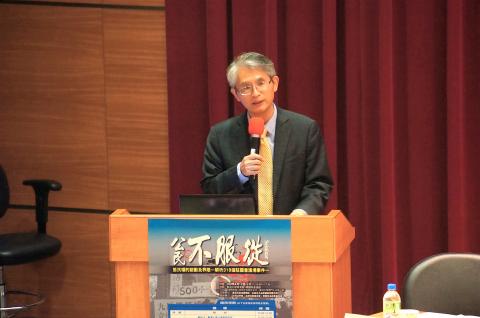During a group discussion titled “Civic Disobedience” hosted by National Taiwan University’s (NTU) college of law, college dean Shieh Ming-yan (謝銘洋) said that if anyone had the right to say “we failed our students,” it was the NTU college of law.
“We have truly failed our students, because we have not taught [President] Ma Ying-jeou (馬英九) well,” Shieh said.
Ma received his bachelor’s degree of law from the college in 1972.

Photo:Taipei Times
Shieh’s comments referred to how the government allegedly intended to indict students for illegal actions when they were the only ones to stand up and highlight the government’s incapabilities and shortcomings.
Shieh’s comments also alludes to the apologies offered by National Chiao Tung University (NCTU) President Wu Yan-hwa (吳妍華) on Thursday to police on duty during the Sunflower movement for “not having taught our students well.”
Wu sent an open letter to university staff on Friday apologizing for her comments, saying: “I have apologized, not because I felt the students have done something to dishonor the school, but for my personal role.”
Wu’s comments on Thursday drew criticism from university students and professors, with 75 professors and 2,700 students co-signing a petition to remove her from office, with alumni even offering to donate NT$1.7 million (US$56,496) to help the efforts of removing Wu from office.
The student’s petition said that they regretted Wu’s comments and were puzzled at her apology.
As an educator and scientific researcher, Wu should have attempted to understand that the origins of the Sunflower movement stemmed from the undemocratic way in which the government handled the cross-strait service trade pact, the elevation of the power of administration over that of legislation, and attempts to repress the civil right of political participation, the petition said.
“Wu instead chooses to stand against the trend and seek to — as a sort of father figure — devalue the efforts of students to participate in their own future and the legitimacy of the democratic system,” the petition said.
Wu further said that she was worried about students being penalized by law for attempting to voice their concerns, adding that since so many alumni and students have complained about her comments, she would apologize for delivering commentary which were not well thought through.
NCTU student Chao Tzu-wen (趙子文) said that although he accepted Wu’s apology, he cannot accept her values.
Meanwhile, NCTU alumnus Chiu Chi-hung (邱繼弘), the manager of CacaFly.com (聖洋科技公司), said on Facebook he had learned while studying at NCTU that he could not be entirely unemotional and uncaring about social issues.
That was one of the reasons he set up the cacaFly Asian Scholarship, through which he is hoping to make NCTU students more competitive.
“I cannot believe Wu has shattered the honor of NCTU students like this,” Chiu said.
CacaFly would not stop any scholarships that have already been approved, Chiu said.
He added that he hoped Wu would not continue to ruin the honor of NCTU students and she should be more careful about what she says when she offers comments on issues.

The US government has signed defense cooperation agreements with Japan and the Philippines to boost the deterrence capabilities of countries in the first island chain, a report by the National Security Bureau (NSB) showed. The main countries on the first island chain include the two nations and Taiwan. The bureau is to present the report at a meeting of the legislature’s Foreign Affairs and National Defense Committee tomorrow. The US military has deployed Typhon missile systems to Japan’s Yamaguchi Prefecture and Zambales province in the Philippines during their joint military exercises. It has also installed NMESIS anti-ship systems in Japan’s Okinawa

TRAGEDY STRIKES TAIPEI: The suspect died after falling off a building after he threw smoke grenades into Taipei Main Station and went on a killing spree in Zhongshan A 27-year-old suspect allegedly threw smoke grenades in Taipei Main Station and then proceeded to Zhongshan MRT Station in a random killing spree that resulted in the death of the suspect and two other civilians, and seven injured, including one in critical condition, as of press time last night. The suspect, identified as a man surnamed Chang Wen (張文), allegedly began the attack at Taipei Main Station, the Taipei Fire Department said, adding that it received a report at 5:24pm that smoke grenades had been thrown in the station. One man in his 50s was rushed to hospital after a cardiac arrest

‘WIN-WIN’: The Philippines, and central and eastern European countries are important potential drone cooperation partners, Minister of Foreign Affairs Lin Chia-lung said Minister of Foreign Affairs Lin Chia-lung (林佳龍) in an interview published yesterday confirmed that there are joint ventures between Taiwan and Poland in the drone industry. Lin made the remark in an exclusive interview with the Chinese-language Liberty Times (the Taipei Times’ sister paper). The government-backed Taiwan Excellence Drone International Business Opportunities Alliance and the Polish Chamber of Unmanned Systems on Wednesday last week signed a memorandum of understanding in Poland to develop a “non-China” supply chain for drones and work together on key technologies. Asked if Taiwan prioritized Poland among central and eastern European countries in drone collaboration, Lin

ON ALERT: Taiwan’s partners would issue warnings if China attempted to use Interpol to target Taiwanese, and the global body has mechanisms to prevent it, an official said China has stationed two to four people specializing in Taiwan affairs at its embassies in several democratic countries to monitor and harass Taiwanese, actions that the host nations would not tolerate, National Security Bureau (NSB) Director-General Tsai Ming-yen (蔡明彥) said yesterday. Tsai made the comments at a meeting of the legislature’s Foreign Affairs and National Defense Committee, which asked him and Minister of National Defense Wellington Koo (顧立雄) to report on potential conflicts in the Taiwan Strait and military preparedness. Democratic Progressive Party (DPP) Legislator Michelle Lin (林楚茵) expressed concern that Beijing has posted personnel from China’s Taiwan Affairs Office to its